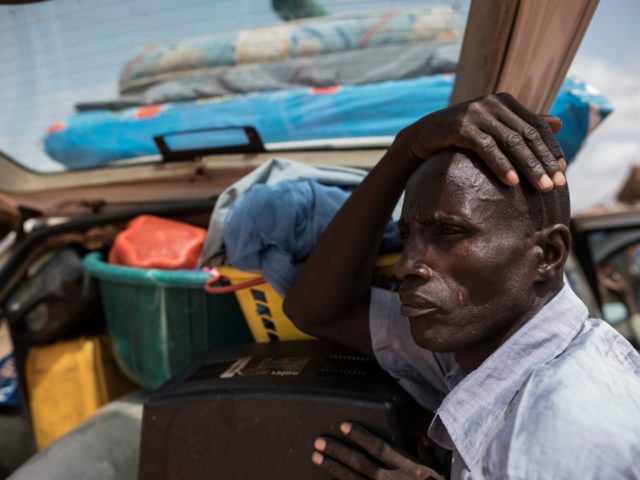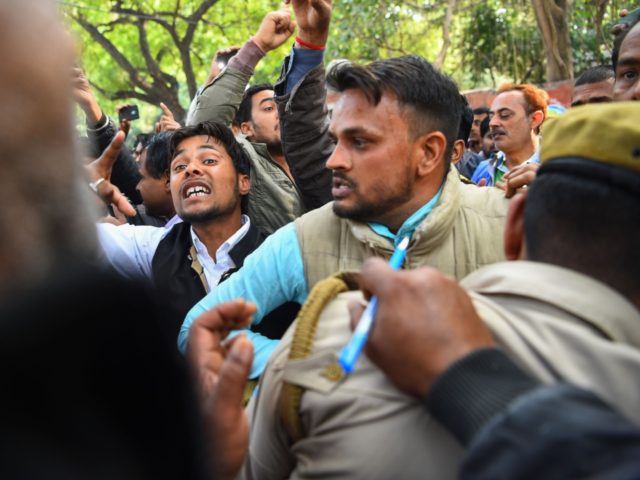Islamists Burn Houses, Murder Nine More Christians in Nigeria

4:52
Muslim Fulani militants killed nine more Christians in Nigeria’s Middle Belt over the weekend, the latest strike in a string of lethal, religiously motivated attacks.
The governor of Kaduna state, Nasir El-Rufai, confirmed that the assault in the Sanga local government area had claimed at least nine lives, adding to the death toll of 120 Christians massacred in central Nigeria since February.
“The security agencies have so far recovered nine corpses, including children,” El-Rufai said. “The attackers also burnt several houses in the village. The government condemns this attack on the lives and security of citizens and appeals to our communities to resist those who do not want peace.”
A week ago, the Fulani jihadists, who have become a greater threat to Nigerian Christians than the Islamist terror group Boko Haram, raided the villages of Inkirimi, Dogonnoma, and Ungwan Gora in the Kajuru Local Government Area, destroying 143 homes, killing 52 people, and wounding dozens more.
From June 2015 to June 2018, Fulani militants “killed 8,800 Christians and other non-Muslims,” Nigeria’s Daily Post reported last year. During that same period, terrorists torched “not less than 1,000″ churches and other places of worship.
Despite the severity of these massacres, they went virtually unreported by international media.
Governor El-Rufai has vowed that the government, security agencies, and religious institutions will work towards creating “sustainable peace.”
“In this moment of grief, we must come together to defeat the machinations of those who have no notion of respect for the lives of others,” El-Rufai said.
“Violence has left an unacceptable toll of death and injury, loss of livelihoods, pain and fear. We must overcome this by respecting our common humanity, settling differences peacefully and promptly reporting threats and suspicions to the appropriate authorities. Evil will never triumph over our common humanity,” he said.
When mainstream media have reported on the slaughter of Christians in central Nigeria, they have downplayed the religious nature of the killings, preferring to attribute the violence to “ethnic tensions,” a “battle for land and resources,” or even “climate change.”
Nigeria’s President Muhammadu Buhari, who is himself of the Fulani ethnic group, has encouraged this narrative, minimizing the importance of religion in the conflict.
Two local Catholic bishops, however, along with other Christian leaders, have insisted in calling out the violence for what it is: a “clear agenda for Islamizing the Nigerian Middle Belt” by using armed Fulani jihadists.
One of the bishops, Matthew Ishaya Audu of Lafia, said last year that the ongoing attacks are not random or economically motivated, but purposefully target Christians.
“They want to strike Christians,” Bishop Audu said, “and the government does nothing to stop them, because President Buhari is also of the Fulani ethnic group.”
Other observers agree that the attacks form part of a larger plan to eliminate Christians from the area.
“The killings are becoming no longer herder and farmer clashes” but a “deliberate attempt to conquer and occupy the land of the people’s ancestral heritage,” said Dr. Soja Bewarang, while denouncing an attack on a Bible school that trained Christian missionaries in Gana-Ropp village.
Reverend Gideon Para-Mallam, of the International Fellowship of Evangelical Students in Jos, said that the violence is part of a pattern, an emerging agenda, which represents “another Boko Haram in disguise.”
The targeted nature of the attacks in central Nigeria is indicative, Para-Mallam said, “because Plateau state is the epicenter of Christianity.”
President Buhari condemned the most recent violence and the “ethnic and religious bigotry” in a statement Saturday. He stressed, however, that all “communities involved” must find a “lasting solution.”
“[The] lack of cooperation by those involved might frustrate government’s efforts towards finding a lasting solution, especially if those efforts are politicized,” Buhari said. “If the people resist government’s efforts to hold the perpetrators and their sponsors accountable, it would be very difficult to bring the violence to a permanent end.”
In its 2018 report, the independent United States Commission for International Religious Freedom (USCIRF) determined that Nigeria should be designated as a “country of particular concern,” or CPC, a term for governments “that engage in or tolerate systematic, ongoing, egregious violations of religious freedom.”
The USCIRF has designated Nigeria a CPC every year since 2009.
Mentally Disabled Christian Beaten by Muslim Mob in Pakistan

5:29
A Pentecostal Christian with a mental disability was beaten up by a Muslim crowd in Pakistan last week, after a neighbor accused him of blasphemy against the prophet Muhammad.
Hafiz Mudassir, a Muslim cleric, reportedly burst into the home of 42-year-old Stephen Masih on the morning of March 11 in the Sialkot District, north of Lahore, accusing the mentally disabled man of blasphemy.
According to Francis Masih, Stephen’s older brother, Stephen had become engaged in a heated discussion with a Christian brother-in-law over fasting and prayer during Lent when he became irritated and began shouting. Overhearing the argument, their Muslim neighbor Mr. Mudassir took it upon himself to reprimand him.
“We told Mudassir that it was not right for him to intervene in our family issue, but he took offense and raised hue and cry in the street, alleging that Stephen had committed blasphemy,” Masih said.
Mudassir reportedly stormed out of Stephen’s house in anger, warning that he would teach Stephen a lesson. Not long afterward, Mudassir returned, leading a mob of angry Muslims.
“Mudassir and Mohammad Rafiq, another neighbor, provoked them to attack Stephen,” Masih said. “They not only beat him up mercilessly but also attacked other family members who tried to save him.”
Someone eventually called the police, who rescued Stephen from the violent mob, he added.
“The police took my brother away, and it was after some time that we learned that he had been charged with blasphemy,” Masih said.
“We have been running from pillar to post, as we are very worried about his condition, especially since he was ruthlessly beaten up by the mob, but the police are not arranging our meeting. They keep telling us that he is safe and being taken care of,” he said.
In his testimony to Badiana police, Mudassir said he had been standing outside his house when he heard Stephen Masih shouting insulting words about Muhammad.
“I and another neighbor, Mohammad Rafiq, repeatedly asked Stephen to refrain from uttering blasphemous remarks, but he did not pay heed to our requests,” Mudassir told police. “This blasphemous act has caused immense agony to Muslims of the neighborhood, therefore Stephen should be punished as per the law.”
According to news media, the report was filed under Section 295-C of Pakistan’s blasphemy law, which calls for the death penalty for defaming the prophet Muhammad.
Mohammad Ashraf, the official who registered the case, told Morning Star News that police have not yet determined whether Stephen’s diminished mental capacity will be a factor.
“We are investigating the matter, but I cannot yet comment on the family’s claim that Stephen is mentally disabled,” he said. “It is up to the judge to decide once we present him in court.”
Stephen’s sister Alia said that when her brother was in the 5th grade, he came down with typhoid fever and became mentally unwell. Stephen had to drop out of school due to his illness, and his behavior began to change.
Around 12 years ago, a doctor from the Civil Hospital declared Stephen mentally disabled, but the family does not have the medical report.
Faraz Masih, the victim’s nephew and an eyewitness to the event, said the entire neighborhood is aware of Stephen’s mental status and local children often tease and bait him into arguments.
Francis Masih said that when his brother was younger a doctor advised the family to commit Stephen to a mental health facility, but their mother was unwilling to send him away.
“And now we don’t even know where he is being kept and in what condition,” he said.
At only two to three percent of Pakistan’s total population, Christians are particularly vulnerable to persecution under Pakistan’s blasphemy laws, which date back to the military dictatorship of General Muhammad Zia-ul-Haq (1978-1988).
In 1980, Pakistan’s Penal Code was amended to criminalize derogatory remarks against any Islamic personage, with a punishment of three years in prison. Two years later, a clause was added prescribing life imprisonment for willful desecration of the Qur’an and, in 1986, another clause was added to include blasphemy against the Prophet Muhammad as a crime punishable by death or life imprisonment.
For years, the U.S. Commission on International Religious Freedom (USCIRF) pressed the State Department to issue a stronger condemnation of Pakistan for its grave violations of religious freedom, advising it to add Pakistan to its list of Countries of Particular Concern (CPCs).
Pakistan’s “repressive blasphemy laws” continue to “violate religious freedoms and to foster a climate of impunity,” the USCIRF said.
In its 2015 annual report, the USCIRF stated that “Pakistan represents one of the worst situations in the world for religious freedom for countries not currently designated by the U.S. government as ‘countries of particular concern.’”
In January 2018, the U.S. State Department announced that it would finally add Pakistan to its Special Watch List for severe religious freedom violations, citing the egregious abuse of Christians, Hindus, Ahmadi Muslims, and other minorities in the country.
Soon after, the U.S. State Department warned Americans against travel to Pakistan, citing Islamabad’s enforcement of the nation’s strict blasphemy laws, which have primarily targeted Christians and other minorities in the Sunni Muslim-majority country.
“Sectarian violence remains a serious threat throughout Pakistan, and the Government of Pakistan continues to enforce blasphemy laws. Religious minority communities have been victims of targeted killings and accusations of blasphemy,” it said in a statement.
Follow Thomas D. Williams on Twitter
No comments:
Post a Comment